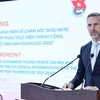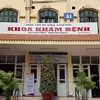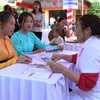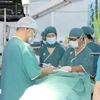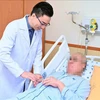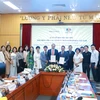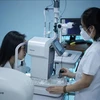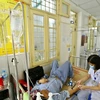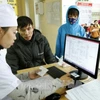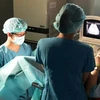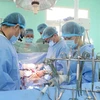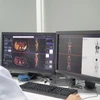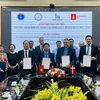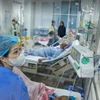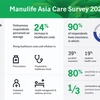Nearly 45,000 individuals arriving in Vietnam by air, sea and land from countries affected by the Middle East Respiratory Syndrome Coronavirus (MERS-CoV) have been screened by body-temperature scanners, a health official said.
MERS-CoV, first reported in Saudi Arabia in 2012, belongs to the family of corona viruses, which also includes SARS, the disease that struck Asia in 2003. It has a much higher fatality rate than SARS and there is no cure or vaccine.
The deadly virus is currently found in over 26 countries around the world, with nearly 1,200 cases and 434 fatalities, including 175 cases reported in the Republic of Korea (RoK) as of June 24.
Vietnam has so far recorded no MERS-CoV cases, but the country faces a high risk due to current trade and tourism ties with the RoK, Thailand and Middle Eastern countries, the Head of the Ministry of Health’s Department for Preventive Medicine, Tran Dac Phu, told a tele-conference with the Steering Committee for Prevention and Control of Infectious Diseases in Hanoi on June 25.
The Ministry of Health ordered the installation of 45 remote temperature scanners at border gates and international airports and requested those travelling to Vietnam from affected countries to fill out medical declaration forms.
The sector is also actively monitoring cases of respiratory illness with unknown causes and MERS-CoV-like symptoms, as well as individuals travelling from infected areas for 14 days upon their arrival in Vietnam.
Since the beginning of the year, all 65 samples have tested negative for the virus.
According to Phu, eight hospitals and medical institutions are capable of testing for the virus, including the National Institute of Hygiene and Epidemiology, the National Hospital of Tropical Diseases, the Pasteur Institute of Ho Chi Minh City, the Ho Chi Minh City Hospital of Tropical Diseases, the Pasteur Institute of Nha Trang, the Central Highlands Institute of Hygiene and Epidemiology, the Hue Central Hospital and the Can Tho Central Hospital.-VNA
The ministry has made a list of hospitals that have quarantine and isolation facilities if any cases of the disease are detected, while also devising a plan to expand isolation facilities, open field hospitals if necessary, and train medical staff on care and treatment.
In the future, precautionary measures will continue to be applied, with a focus on monitoring industrial and processing zones, hotels and medical stations.
Rapid-response teams will be strengthened, while the public will be made aware of preventive measures via the media.
At the event, Health Minister Nguyen Thi Kim Tien called upon medical stations to examine and treat patients with respiratory illnesses in secluded rooms.
The most important steps are early detection, isolated treatment, and the prevention of contamination from patients-to-patients, as well as from patients to medical staff and their relatives.
Appropriate training sessions must be conducted and disinfectant sprays must be used in hospitals nationwide, she said.
MERS-CoV, first reported in Saudi Arabia in 2012, belongs to the family of corona viruses, which also includes SARS, the disease that struck Asia in 2003. It has a much higher fatality rate than SARS and there is no cure or vaccine.
The deadly virus is currently found in over 26 countries around the world, with nearly 1,200 cases and 434 fatalities, including 175 cases reported in the Republic of Korea (RoK) as of June 24.
Vietnam has so far recorded no MERS-CoV cases, but the country faces a high risk due to current trade and tourism ties with the RoK, Thailand and Middle Eastern countries, the Head of the Ministry of Health’s Department for Preventive Medicine, Tran Dac Phu, told a tele-conference with the Steering Committee for Prevention and Control of Infectious Diseases in Hanoi on June 25.
The Ministry of Health ordered the installation of 45 remote temperature scanners at border gates and international airports and requested those travelling to Vietnam from affected countries to fill out medical declaration forms.
The sector is also actively monitoring cases of respiratory illness with unknown causes and MERS-CoV-like symptoms, as well as individuals travelling from infected areas for 14 days upon their arrival in Vietnam.
Since the beginning of the year, all 65 samples have tested negative for the virus.
According to Phu, eight hospitals and medical institutions are capable of testing for the virus, including the National Institute of Hygiene and Epidemiology, the National Hospital of Tropical Diseases, the Pasteur Institute of Ho Chi Minh City, the Ho Chi Minh City Hospital of Tropical Diseases, the Pasteur Institute of Nha Trang, the Central Highlands Institute of Hygiene and Epidemiology, the Hue Central Hospital and the Can Tho Central Hospital.-VNA
The ministry has made a list of hospitals that have quarantine and isolation facilities if any cases of the disease are detected, while also devising a plan to expand isolation facilities, open field hospitals if necessary, and train medical staff on care and treatment.
In the future, precautionary measures will continue to be applied, with a focus on monitoring industrial and processing zones, hotels and medical stations.
Rapid-response teams will be strengthened, while the public will be made aware of preventive measures via the media.
At the event, Health Minister Nguyen Thi Kim Tien called upon medical stations to examine and treat patients with respiratory illnesses in secluded rooms.
The most important steps are early detection, isolated treatment, and the prevention of contamination from patients-to-patients, as well as from patients to medical staff and their relatives.
Appropriate training sessions must be conducted and disinfectant sprays must be used in hospitals nationwide, she said.
